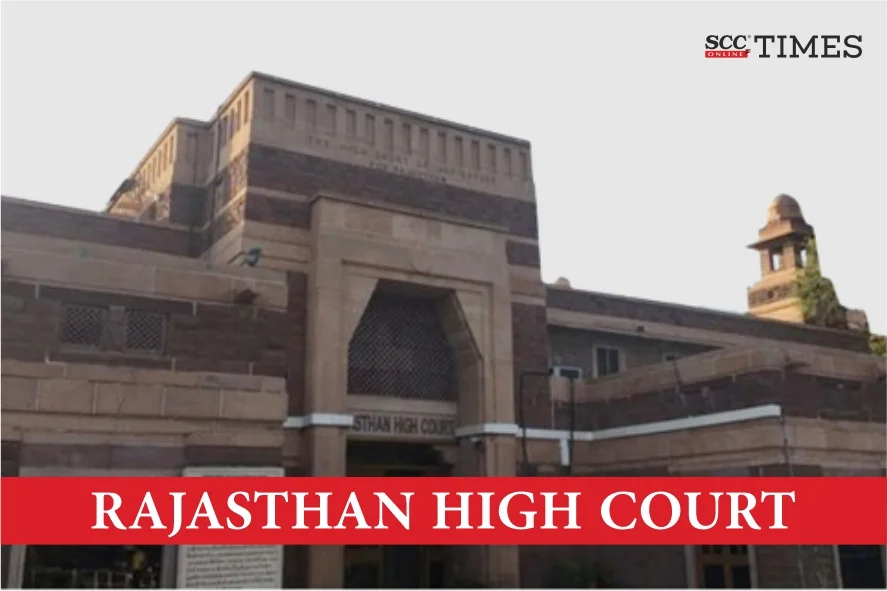Rajasthan High Court: In a writ petition filed by petitioner, a 11-year-old rape survivor, seeking Court’s permission to be admitted to Class-III and continue her education, a single-judge bench of Anoop Kumar Dhand, J*., recognised her fundamental right to education under Article 21-A of the Constitution and issued directions to ensure that she is provided with an opportunity to continue her education.
The instant matter originates based on three letters dated 26-11-2024, 24-01-2025, and 17-02-2025, written by the Superintendent of Government Balika Grah, Gandhinagar, Jaipur, requesting the Court’s permission to allow the petitioner-rape survivor to study in Class-III.
The Court in its order dated 17-01-2024 issued following directions regarding the care and welfare of the petitioner who was admitted to the Government Balika Grah and needed immediate support for her health and safety, particularly during her pregnancy —
-
Directed the respondents to admit the petitioner to Government Balika Grah and provide her with necessary care, nutritious food, medical attention, and education until she attained the age of majority.
-
Instructed the Additional Chief Secretary of the Departments of Medical Health and Women and Child Development to ensure the provision of a female nursing attendant at the Balika Grah for the petitioner’s care.
-
Placed various medical and privacy protections to safeguard the petitioner’s well-being before and after delivery.
-
Made provisions for the petitioner’s child, including the involvement of the Child Welfare Committee (CWC) for the child’s custody and adoption.
-
Granted permission to the petitioner to give the child for adoption to the willing parents, in compliance with the law.
-
Directed to pay the petitioner compensation under the Rajasthan Victim Compensation Scheme, 2011
-
Directed the continuous monitoring, including visits by the Child Protection Officer and submission of report annually by the concerned authorities.
The petitioner had given birth to her child, which was handed over to the Central Adoption Resource Authority (CARA) for adoption. The petitioner, who is now around 11 years old, has expressed her desire to study and pursue her education, aiming to build a future for herself.
Considering the circumstances, the Court recognised that the victim’s age and her right to education are vital for her development. The Court, while acknowledging the importance of education in empowering children, especially girls, held that the victim must be allowed to continue her studies in a nearby government school.
The Court stated that the Right to Education is enshrined as a fundamental right under Article 21-A of the Constitution of India. The Court stated that Article 21-A along with the Right of Children to Free and Compulsory Education Act, 2009, mandates that every child between the ages of 6 and 14 years has the right to free and compulsory education.
“With this, India has moved forward to a rights based framework that casts a legal obligation on the Central and State Governments to implement this fundamental child right as enshrined in the Article 21A of the Constitution, in accordance with the provisions of the RTE Act.”
The Court reiterated that no child should be liable to pay fees or charges that could prevent them from pursuing elementary education, which is a fundamental right guaranteed by the Constitution.
The Court highlighted the importance of education for girls and stated that education empowers girls, helps address societal issues like poverty, gender inequality, and child marriage, and improves economic outcomes for families. The Court further stated that despite improvements in recent years, girls in India still face significant barriers to education, such as societal expectations, financial constraints, and gender disparities in enrollment and completion rates.
“Despite the benefits of girl education, many challenges remain in India. Girls are often expected to prioritize household chores and marriage over education, and many families cannot afford to send their daughters to school.”
The Court emphasised on the need to remove these barriers and ensure that every girl, particularly the petitioner in this case, has the opportunity to receive an education that would allow her to break free from the cycle of poverty and exploitation.
While recognising the petitioner’s interest in studying, the Court issued the following directions:
-
Permitted the Superintendent of Government Balika Grah, Gandhinagar, Jaipur, to admit the petitioner into any government school situated near the Balika Grah.
-
The government shall bear the expenses for her education, including books and study materials, ensuring she can continue her studies until she reaches the age of majority.
-
Directed the concerned authorities to submit a report to the Court on the petitioner’s admission to the school, along with documentary proof.
-
Directed the Superintendent, Balika Grah, the Superintendent of Police (Rural), District Jaipur, and the Child Protection Officer to ensure the petitioner’s continuous education without any hindrance and to submit an annual report on her progress.
[Victim v. State of Rajasthan, 2025 SCC OnLine Raj 1771, Decided on 25-04-2025]
*Order by Justice Anoop Kumar Dhand



